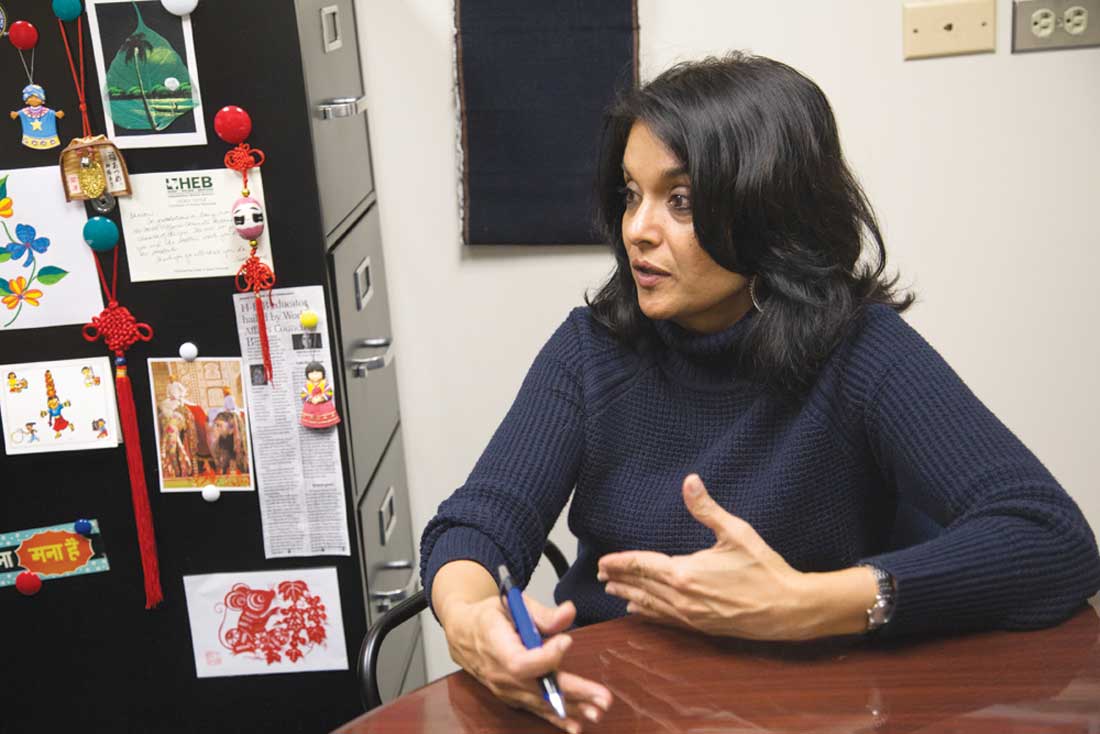Bhavani Parpia’s trip to India in 2011 changed her life and affected many thousands of students and educators around the world.
As the international business program coordinator for the Hurst-Euless-Bedford school district, Parpia had received a federal grant to take 17 area educators to study development in her home country. Visiting an AIDS orphanage, she asked a question of her lunch companion, a young boy with HIV.
“Like any adult, sometimes you ask children ‘What do you want to be when you grow up?’ ” she said. “His response was, ‘I don’t know if I will live to be an adult.’ That answer just stumped me. I was appalled at myself for asking.”
Parpia said she felt compelled to act, to do something that might give a little hope to children all over the world who don’t see much of a future for themselves. As a life-long educator, she didn’t have a lot of money to give. But the one thing she could do, she said, was teach. By the time she left India after her four-week visit, she had committed to coming back to train teachers in four schools in four different cities.
True to her word, she returned to India the following year, using money from her retirement fund to pay for the trip. She taught Indian teachers some of the innovative techniques she had honed in North Texas classrooms.
As a result of her work, “We found out that student achievement started going up,” she said. “These students who were previously leaving school and going back to manual and domestic labor were now passing and doing well.”
When she came home, she formed ConnecTeach, a nonprofit that has now touched the lives of more than 130,000 children and 2,000 educators worldwide. Parpia said she and ConnecTeach’s trainers help the Indian teachers learn to identify struggling students and advanced students and adjust lessons accordingly, to more effectively engage students through questioning, to collaborate among themselves, and to better use limited resources.
She still makes yearly visits to India and leads online professional development workshops for teachers in Pakistan, Gaza, and, beginning next year, in Uganda.
Parpia said that her charity work has changed the way she approaches her job here. She wants the HEB district program to be about more than just language classes.
“There’s a need for the next generation of children to become engaged global citizens,” she said. “That doesn’t just mean learning the language but actually learning how to communicate in it and learning how to resolve problems.” (The district is already diverse: Its students and their parents speak 72 languages.)
She has brought that worldview to students in the Mid-Cities, introducing Arabic, Mandarin Chinese, and Hindi language curricula in the HEB district.
Parpia, who was born in Erode, India, and came to the United States in 1982 to get her master’s degree, speaks five languages, including Hindi. She doesn’t speak Chinese or Arabic.
Those languages are taught at four schools in the HEB district: Veridian Elementary, Central Junior High (where the program started in 2007 with Chinese and Hindi), and Trinity and L.D. Bell high schools. The district began offering Arabic in 2010, at Central.
To increase interest in the classes, Parpia visits elementary and middle schools and promotes the benefits of learning the languages. The program also offers an exchange program to schools in China, India, and Morocco as an enticement. So far, she said, the course offerings have been met mostly with enthusiasm, and enrollment has grown steadily every year.
District spokeswoman Judy Ramos said HEB school officials wanted to offer those three languages to better prepare students for changing demography and business realities in a rapidly shrinking world.
Arabic, Chinese, and Hindi “were chosen because they are up-and-coming languages, used more in business,” she said.
The district’s language program is progressive, and not just by Texas standards. HEB was only the second district in North Texas to offer Arabic, and it’s the only program in the country that offers all three of those languages from first through 12th grades.
The Dallas school district has offered Mandarin Chinese for five years, with classes now at six campuses, and plans to add Hindi to its curriculum next year. It does not teach Arabic. The Fort Worth school district offers Mandarin Chinese at Paschal and South Hills high schools and at the Young Women’s Leadership Academy, which enrolls sixth and seventh-graders only. It does not offer Arabic or Hindi.
Parpia works to get her students and their community on the road to becoming “global citizens.” Once a year, Parpia takes some of her students to the University of Texas at Austin to meet with language professors and students there. In October, her district’s international business initiative program hosted a workshop on the relevance of Hindi language and culture in business, art, and literature, with guest speakers from UT, New York University, and University of Maryland.
Through her charity, she has involved American students in a unique photojournalism project with students in India.
On one of her trips to India, she said, she wanted to test the students’ capacity for creative writing.
“What we got back were handwriting samples,” she said. “I took a step back and thought, ‘We have to approach this from another angle.’ ”
Using grants from the Donna Wilhelm Family New Works Fund, she passed out cameras to some of the poorest students in India. She asked those students, many of whom had only basic reading and writing skills, to answer three questions, using only pictures:
• Where do you do homework?
• What do you see on your way to school?
• If there was one thing you could change in your world, what would it be?
She sent the resulting photos to students at three Dallas-area schools from varying socioeconomic strata — North Hills Prep in Irving, Highland Park High School, and Barack Obama Male Leadership Academy in Dallas — and asked them to help the Indian students write stories based on the pictures.
The American students “started talking to these kids, and they started to realize that even though these are children living in extreme poverty, their approach and their outlook on life was so full of hope,” she said. “The kids here realized that what they were doing is giving [the Indian students] a voice.
“That level of engagement completely floored me,” she said. “There was a huge change in [her students’] perspective.”
Parpia hopes to turn the experience into a documentary film.
For her charity work, Parpia was recently honored as one of the first two recipients of the Triumph of Spirit Award, bestowed by the Embrey Human Rights Program at Southern Methodist University. The Dallas university is one of seven schools nationwide that offers an undergraduate degree in human rights.
Program director Rick Halperin, former chairman of Amnesty International’s board of directors, said that Parpia earned the award and the $5,000 prize because of her work educating young women in India and other countries.
“She’s a fireball of energy and very committed, especially to the issue of women’s rights education,” he said. Her work “reminded us all of just how precarious women’s rights are in this world, especially that most basic of human rights, which is the right to learn and the right to make something of one’s self with that education.”
Parpia is helping organize an international conference on human rights at SMU in March. It will be open to the public.
“We have people coming from all over the world,” she said, including experts on topics such as the nexus between education and poverty, gender equity, and disabilities.
Her nonprofit has now partnered with CARE, a group founded in 1945 that once delivered millions of “CARE packages” across Europe. Now the international non-governmental organization is focused on fighting poverty and gender inequality through education.
“The only way for these children to recognize that they even have any human rights is to first get them that most fundamental human right, which is education,” Parpia said.













This was a wonderful success story which could only happen in an ISD other than Fort Worth Independent School District. In FWISD we continue to struggle with ever- declining
student performance (as evidenced by the recent TEA report), retaliation against Teachers who speak out, and corruption. All which flourishes under the watchful and controlling eyes of four dinosaurs – Judy Needham, T.A. Sims, Christene Moss, Norm Robbins, and their recent apprentice, Tobi Jackson. FWISD needs HELP. We need voters to turn out in the coming election so FWISD can become a nurturing environment of educational growth and opportunity like HEB. http://ciafwisd.blogspot.com/2014/12/how-fwisd-grinches-ruin-childrens.html